*IN MEMORIAM*
Dr. Bill Kott passed away on January 8, 2020, just eight days after this interview was recorded.
Use controls above or click here to open this Hometown Heroes podcast in a new window
Episode #610 of Hometown Heroes, airing January 9-13, 2020, features the story of Dr. Bill Kott of Anaheim, CA. Unfortunately, Dr. Kott passed away on January 8, 2020, just 8 days after this interview was recorded.
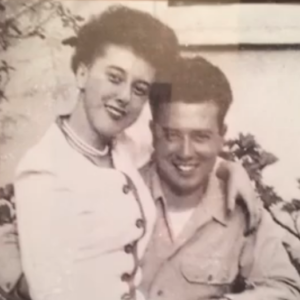
An only child born to German immigrants in Philadelphia, PA, Kott excelled at Central High School, a magnet school with a history going back more than a century at that point. He left home after graduating just after his 17th birthday, and soon found work as a stock boy at a department store. Working for 30 cents per hour, with one change of clothing to his name, the teenager saw value in a military future.
“I’d get clothing, medical care, and friends,” Bill remembers thinking at the time. “Next thing I knew, I was in the Army.”
The Army Specialized Training Program presented the opportunity to take college classes in conjunction with military training, which he did at both the Citadel and the University of Maine. While at Maine, he met a young lady named Eleanor, with whom he corresponded after being sent to the front lines in Europe as an infantry replacement.
“An infantryman is an infantryman,” you’ll hear Kott explain. “I had a rifle, I had a bayonet, I killed people.”
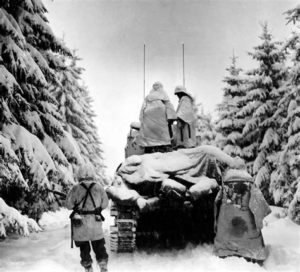
Fighting around Bastogne, Belgium during the Battle of the Bulge, Kott was up against the elements as much as he was against the enemy. You’ll hear him detail some of the frigid conditions that accompanied the worst European winter on record.
“We were living like animals,” you’ll hear him say. “We ate out of a can, no latrine, we went where we could, no place to sleep.”
Thankful he never experienced frostbite, Kott continued into Germany with General George S. Patton’s Third Army after the “bulge” was repelled. The most difficult element of his Army service was the reality of the life and death stakes, for him and his fellow Americans but also for enemy troops. You’ll hear him recall the time he spared a wounded German soldier, as well as the underlying fear that he and so many other men in uniform dealt with daily.
“I expected to be killed. I didn’t expect to come home,” you’ll hear Kott share. “I guess God had other plans for me, but sure, I was scared.”
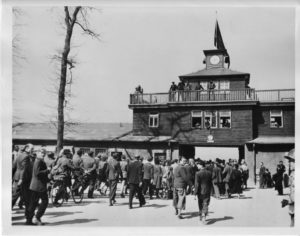
In April, 1945 he arrived at the Buchenwald concentration camp, where he witnessed piles of dead bodies, ovens in the crematorium, and other evidence of the Holocaust. He did not encounter any of the Nazis who had been running the camp.
“The reason the German guards left,” Kott explained. “They knew we were coming. We liberated that camp, not Polish communists.”
That last comment was in response to a controversy that is still brewing as we approach the 75th anniversary of Buchenwald’s liberation. The 6th Armored Division has been recognized as the official liberating unit of the camp, but the role of the approaching Americans in spurring the exodus of the camp’s guards and staff has been minimized over the years in Thuringia, the German state in which Buchenwald is located. During decades behind the Iron Curtain, the region’s version of the camp’s history came to focus more on the role of courageous prisoners who banded together to save lives and work against their Nazi captors. Some accounts have suggested that, led by a group of communists, the prisoners “liberated themselves.” In fact, an effort, led by the son of a Buchenwald survivor, to erect a memorial to the American liberators of Buchenwald was recently rejected by the former concentration camp’s caretakers. Kott never forgot what he witnessed at Buchenwald, and how it struck a then 23-year old American.
“I couldn’t believe that they devised things like that for other humans,” he recalled. “I just couldn’t believe what I saw.”
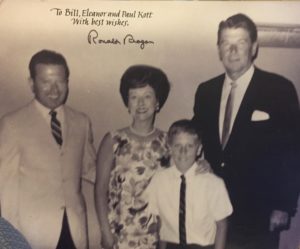
After V-E Day, Kott was sent to the Pacific, expecting to be part of a spearhead unit in the planned invasion of Japan. After atomic bombs were dropped on Hiroshima and Nagasaki, he and so many other Americans were spared the necessity of that invasion, and he eventually returned home to the U.S. He and Eleanor married in Los Angeles in 1946, and enjoyed 61 years of marriage before her passing in 2007. Bill used the G.I. Bill to attend dental school, later becoming an oral surgeon, and even returning to school at age 60 to become a medical doctor. He performed his final oral surgery at age 89, and somewhere in the midst of all that, he found time for a term on the Anaheim City Council. Through all those years, Dr. Kott never shared much about his World War II experiences with his family. It wasn’t until recent years that some of those details began to filter out. In 2013, he finally received the medals he earned seven decades earlier. The following year, he was recognized with the French Legion of Honor medal. In 2018, he had the privilege of connecting with the family of one of the Buchenwald prisoners he had helped to liberate, as well as dropping the puck as the honored veteran at an Anaheim Ducks hockey game.
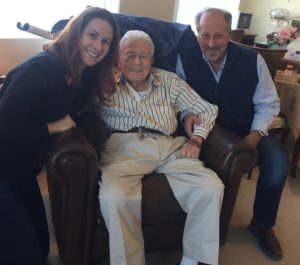
While he didn’t discuss much of his wartime experience with the family, Dr. Kott forged an example of focus, perseverance, and drive that left a powerful impression.
“He never talked about it, he was too busy with trying to take his experience and make it something positive,” you’ll hear Paul Kott, Dr. Kott’s son, relate. “It wasn’t just talk, he walked that talk.”
Dr. Bill Kott touched countless lives through his skilled application of dental and medical care. His service to his community set a high bar for others to follow. The personal example he set at work and home has influenced his entire family, including helping to propel Paul’s efforts to bless his Orange County neighbors, as well as the success of his growing Real Estate company. Paul says that as he and his brother have learned more about their father’s military service, the gratitude they and their families feel has only deepened.
“We can’t emphasize enough that freedom is not free, and somebody paid the price for that” Paul Kott elaborates. “If it wasn’t for guys like my dad, we’d all be speaking German or Japanese.”
Dr. Bill Kott emerged from what many would characterize as a disadvantaged childhood to establish a powerful legacy. Please keep his family in your prayers as they mourn his passing.
—Paul Loeffler
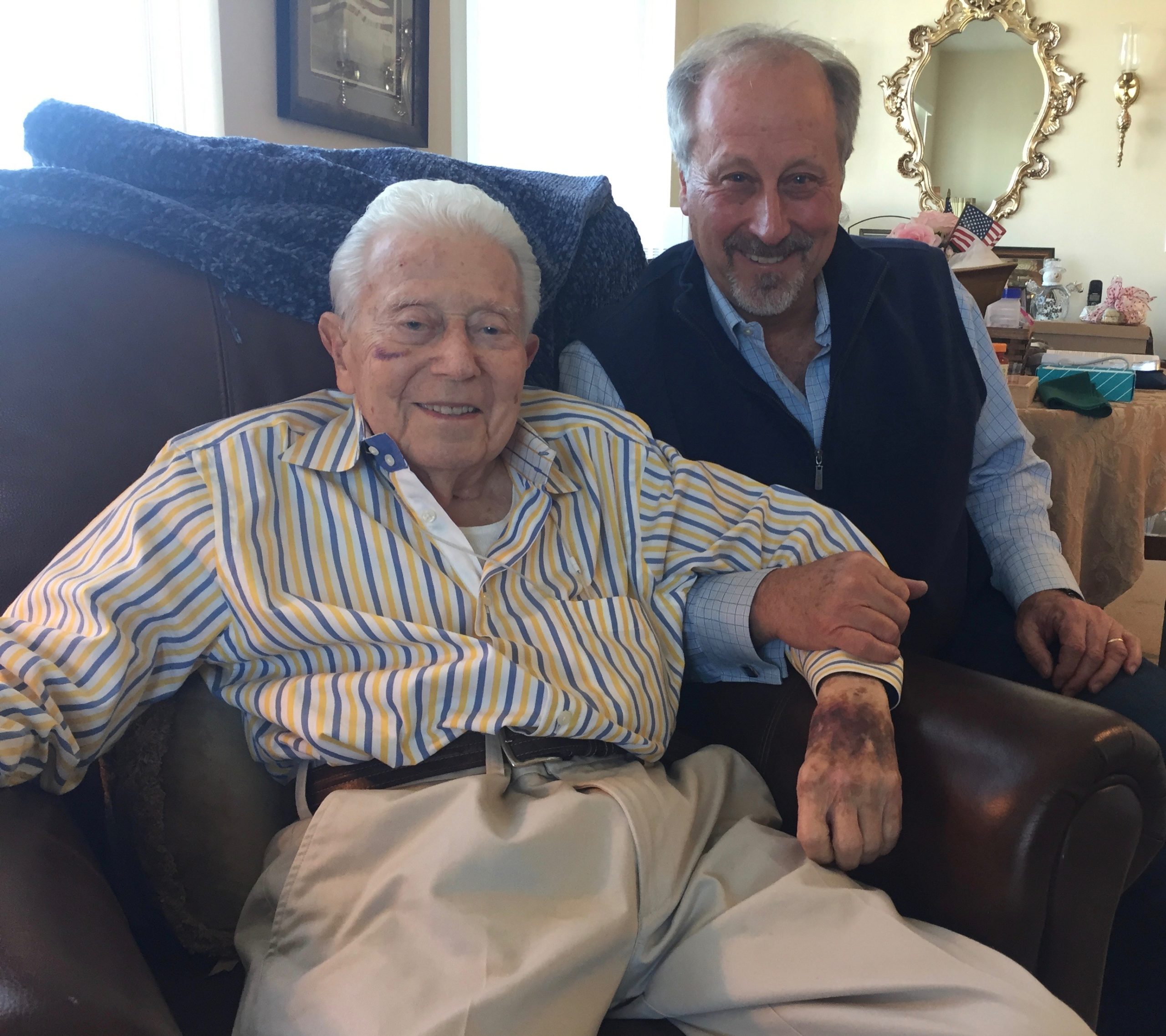

Leave a Reply